|
|
|
Sort Order |
|
|
|
Items / Page
|
|
|
|
|
|
|
| Srl | Item |
| 1 |
ID:
152930
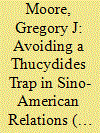

|
|
|
|
|
| Summary/Abstract |
In 2015, Harvard’s Graham Allison wrote an evocative article discussing the “Thucydides Trap” in relations between China and the United States, highlighting the danger of war between a rising power and a reigning power in the international system. Can China and the United States avoid the Thucydides Trap as China rises? This analysis identifies and analyzes seven reasons China and the US might not be able to avoid the trap: the bilateral strategic trust deficit, lack of agreement on the nature of the US pivot, recent trends in China’s maritime policies, disagreements over cyber security, security dynamics underlying China’s Anti-Access/Area Denial and Washington’s AirSea Battle strategies, recent trends in Sino-Russian strategic alignment, and Washington’s concerns about China’s increased defense spending.
|
|
|
|
|
|
|
|
|
|
|
|
|
|
|
|
| 2 |
ID:
147742
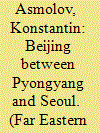

|
|
|
|
|
| Summary/Abstract |
The question of how strictly Beijing is adhering to its policy toward the Korean Peninsula remains relevant today. In the author's view. China's policy with regard to Korea has changed little, on the whole. Looking out for their own national interests, neither China nor Russia is offering any real support to either North or South Korea. This does not eliminate the potential for increased tension in relations between China and North Korea, where Beijing will attempt to tighten the leash while Pyongyang ensures that it has sufficient room to maneuver.
|
|
|
|
|
|
|
|
|
|
|
|
|
|
|
|
| 3 |
ID:
149179
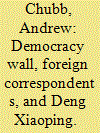

|
|
|
|
|
| Summary/Abstract |
This article identifies and explains the role of the Western media in Chinese politics between November 1978 and April 1979, when the rise of Deng Xiaoping within the Communist Party coincided with the emergence of the Democracy Wall free speech movement on China’s streets, and the normalization of Sino-American relations. At this critical juncture in twentieth-century history, foreign journalists in Beijing were much more than simply gatekeepers of a conduit to the outside world. Chinese activists believed that, through the Western media, they could reach domestic audiences in China, and potentially even the Party leadership. Indeed, foreign reporting contributed to the movement’s spread to issue_image_89_3_Foreign Correspondents China - EA Photo2other parts of the country, while strengthening and accentuating its most radical aspects. However, the main beneficiary of these interactions was Deng, who enlisted Democracy Wall and the foreign media, at times in conjunction, to advance his domestic and international objectives. Once he had secured control of the Party’s political direction, and the normalization of Sino-American relations, the foreign press provided the rationale, if not the impetus, for the movement’s suppression. Drawing on participant interviews, new Chinese sources, and analysis of press archives, this article brings important new insights into the momentous political events that set in motion the ongoing transformation of China and the region. It also illuminates the little-studied role of international media in producing “radical flank effects” that can help or hinder both social movements and state authorities. The case stands as a cautionary example for social activists attempting to harness the power of international media today.
|
|
|
|
|
|
|
|
|
|
|
|
|
|
|
|
| 4 |
ID:
155255
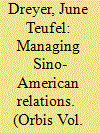

|
|
|
|
|
| Summary/Abstract |
Past Chinese policy has proved deficient in managing the Sino-American relationship. Your administration should break with past assumptions, cease allowing China to set the agenda, be aware of specious Chinese claims based on distortions of history, avoid using meaningless or misleading terms in speaking of the relationship, be cognizant of the tendency of some China specialists to self-censor, establish clear guidelines for the limits of U.S. tolerance of Chinese behavior, and be prepared to respond forcefully if they are transgressed Be aware that failure to do so will be regarded as acquiescence to Chinese claims and an invitation to advance future claims.
|
|
|
|
|
|
|
|
|
|
|
|
|
|
|
|
| 5 |
ID:
188262


|
|
|
|
|
| Summary/Abstract |
Concern over the national security implications of transnational industrial integration is growing in the United States. Direct and indirect Sino-American integration in high-technology industrial sectors is regarded as a threat to American industrial security in terms of the National Technology and Industrial Base and technological primacy. The American government has launched a number of national and international initiatives to strengthen the resilience of American defence supply chains and limit China’s capacity to derive defence-industrial benefits from industrial ties. The emerging industrial security framework supports the functional requirements of American defence firms, but threatens American arms programmes through its potential impact on the affordability of arms, the flexibility of arms production arrangements, the scale and time frame of arms production, and the development of arms over the long-term, as restrictions on offshore collaboration threaten industrial processes that are central to high-technology production and development.
|
|
|
|
|
|
|
|
|
|
|
|
|
|
|
|
| 6 |
ID:
152154
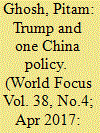

|
|
|
|
|
| Summary/Abstract |
Beijing has repeatedly made it unequivocally clear that Taiwan is the most important of its core interests. If the incoming U.S. administration actively challenges the One China policy, Beijing will certainly and resolutely strike back, leading to diplomatic confrontations or even military conflicts. If Trump would like to have a war with China to prove the United States is great again, then he should keep testing Beijing’s redline on Taiwan. Perhaps Trump will change his mind and adhere to long-standing U.S. policy on Taiwan.
|
|
|
|
|
|
|
|
|
|
|
|
|
|
|
|
| 7 |
ID:
152470
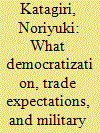

|
|
|
|
|
| Summary/Abstract |
This article analyzes Sino-American relations using three strands of international relations scholarship–internal stability, trade expectations, and military perception. There has been no attempt to date to explore the stability of Sino-American relations in the context of linkage between them. This study argues that political and economic interactions of the two major powers provide reasons to be optimistic that the relations will stay relatively stable. Although there is a significant amount of mistrust between Beijing and Washington on military and cyber matters, deterrence is largely at work at the highest level of interactions.
|
|
|
|
|
|
|
|
|
|
|
|
|
|
|
|
| 8 |
ID:
141745


|
|
|
|
|
| Summary/Abstract |
U.S. strategists have generated a torrent of diverse ideas for how America should respond to the ascent of China. Consideration of the full range of strategic options available to future presidents broadly offers a means of forecasting whether Sino-American relations will evolve in an amicable or antagonistic direction. This article identifies six prospective choices of U.S. strategy toward China, each advancing unique assumptions of Chinese ambitions and capabilities, and appropriate means for checking them. While diverse in tactics, all are nevertheless united in a deeply embedded suspicion of China's long-term intentions and a commitment to thwarting any challenge to American preeminence in Asia. As tensions with China escalate, the United States will likely opt for provocative strategies that emphasize a strengthened military footprint and seek assurances of Beijing's peaceful intentions by pushing for democratization in China and pressing for its further integration in the liberal world order.
|
|
|
|
|
|
|
|
|
|
|
|
|
|
|
|
|
|
|
|
|